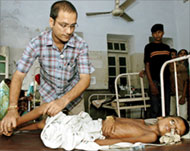India battles encephalitis epidemic
The death toll from Japanese encephalitis in northern India has crossed the 1000 mark, making it the most fatal outbreak of the illness in nearly two decades, an official said.

Nearly all the dead were children.
At least 300 more people were battling the illness in hospital, Director General of Health Services OP Singh said in Lucknow, state capital of Uttar Pradesh, on Monday.
“At least 15 more children have died of this mosquito-borne disease, taking the toll to 1015,” Singh said, adding that many of the children in hospital were in serious condition.
Doctors have said they are struggling to treat the children in deplorable medical conditions, with many lying two to a bed. They complain of a lack of life-saving medicines, oxygen and medical staff.
Uttar Pradesh is India’s most populous state with 180 million people and one of its poorest. Singh said the number of encephalitis admissions to hospital was slowing.
Lack of vaccination
“Only 28 new cases were reported overnight,” Singh said, in contrast to the around 60 who were being reported daily in the first half of September.
 |
|
Doctors are struggling to treat |
Some 4400 cases of Japanese encephalitis have been reported since the outbreak at the end of July, health officials say.
The disease, which is transmitted from pigs to humans via mosquitoes, strikes during the annual monsoon rains from June to September.
Health workers say a lack of widespread vaccination and other preventive action is to blame for the scale of the outbreak.
Japanese encephalitis first surfaced in Uttar Pradesh in 1978, killing 721 people, and has become endemic to the region. Deaths reached a record 1228 in 1988.
Over 4000 people have died in the state since the disease first hit.